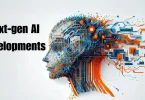Quantum computing is often regarded as one of the most transformative technologies of the 21st century. While still in the experimental stages, its potential to radically alter industries, accelerate scientific discovery, and redefine our technological landscape is immense. To understand how quantum computing will change the world? we must first examine the key principles behind the technology, explore its potential applications, and discuss the challenges that lie ahead.
1. The Foundation of Quantum Computing
 At the core of quantum computing lies quantum mechanics, the branch of physics that describes the behavior of particles on the atomic and subatomic level. Unlike classical computers, which use bits to represent information as either 0 or 1, quantum computers leverage quantum bits, or qubits, that can exist in multiple states simultaneously due to a phenomenon known as superposition.
At the core of quantum computing lies quantum mechanics, the branch of physics that describes the behavior of particles on the atomic and subatomic level. Unlike classical computers, which use bits to represent information as either 0 or 1, quantum computers leverage quantum bits, or qubits, that can exist in multiple states simultaneously due to a phenomenon known as superposition.
Qubits: The Building Blocks of Quantum Computing
Qubits are the fundamental units of quantum computing. They are not limited to being in just one of two states (0 or 1) like classical bits; instead, they can represent both 0 and 1 at the same time thanks to superposition. This ability to exist in multiple states means that quantum computers can process an exponential amount of data at once, potentially outperforming classical computers in certain tasks.
Entanglement: A New Level of Data Interdependence
In addition to superposition, quantum computers use entanglement to link qubits in such a way that the state of one qubit directly influences the state of another, even if they are separated by large distances. This interconnectedness allows quantum computers to perform computations with a level of parallelism and efficiency that is unattainable with classical systems.
Quantum Interference: Optimizing for Correct Answers
Quantum computers also utilize quantum interference, which manipulates the probability amplitudes of quantum states to increase the likelihood of arriving at the correct answer. This ensures that the quantum system will converge on the optimal solution by canceling out incorrect paths while reinforcing correct ones.
These principles combine to give quantum computing the potential to solve certain types of problems exponentially faster than classical computers.
You may also like to read this:
What Is The Future Of AI And Machine Learning? In 2025?
Next-Gen AI Developments: Trends To Watch In 2025
The Latest Innovations In Technology Shaping Healthcare
Future Tech Trends 2024: Key Advancements Expected
Top Best Future Tech Gadgets To Watch In 2024 You Need
The Role Of Nanotechnology In Future Tech: Healthcare Impact
How AI Is Shaping The Future Workforce? In 2025
2. Applications of Quantum Computing: How It Will Change the World
As quantum computing matures, its applications are expected to touch almost every aspect of modern life. Let’s examine some of the most significant areas where quantum computing will change the world:
Cryptography: Revolutionizing Digital Security
Cryptography plays a pivotal role in securing everything from online banking transactions to government communications. Modern cryptographic systems, such as RSA encryption, rely on the difficulty of factoring large numbers, a task that is computationally expensive for classical computers. However, quantum computers, using algorithms like Shor’s Algorithm, can factor these large numbers exponentially faster, potentially rendering current encryption methods obsolete.
While this poses a risk to data security, it also opens up new opportunities for creating quantum-resistant encryption. Quantum key distribution (QKD), for example, uses the principles of quantum mechanics to ensure that any attempt to intercept communication can be detected. This level of security would make data exchanges virtually unbreakable, even in a world dominated by quantum computers.
Drug Discovery and Healthcare: Accelerating Medical Advancements
One of the most promising areas for quantum computing is in the field of drug discovery and healthcare. Developing new drugs involves simulating molecular structures and predicting how they interact with biological systems. Classical computers struggle with the complexity of simulating large molecules and their interactions. Quantum computers could revolutionize this process by accurately modeling molecular behavior, significantly speeding up drug discovery.
In addition to accelerating drug design, quantum computers could help unravel the complexities of biological systems, leading to advancements in personalized medicine and targeted therapies. For example, quantum simulations of protein folding could provide insights into diseases like Alzheimer’s and cancer, enabling the development of more effective treatments.
Optimization Problems: Unlocking Efficiency in Complex Systems
Many industries rely on solving optimization problems—tasks that involve finding the most efficient solution from a set of possibilities. Classical computers, though powerful, struggle with highly complex optimization tasks that involve vast amounts of data and variables. Quantum computers excel in this domain because of their ability to process many possibilities simultaneously.
For instance, quantum computing could optimize:
- Supply chains by determining the most efficient distribution routes and inventory management.
- Financial portfolios by identifying the best investment strategies and risk assessments.
- Transportation systems, such as airline scheduling and freight management, to reduce costs and improve efficiency.
In industries where time and resource efficiency are critical, quantum computers will offer unparalleled advantages.
Artificial Intelligence and Machine Learning: Enhancing Computational Power
Artificial intelligence (AI) and machine learning (ML) are rapidly advancing fields, but they still face limitations in processing speed and complexity. Quantum computers could provide a significant boost to AI and ML by enabling faster data processing and more efficient algorithms.
Quantum computers can analyze large datasets in parallel, making machine learning algorithms more efficient. For example, quantum-enhanced machine learning could improve pattern recognition in fields such as natural language processing, image recognition, and speech analysis. These improvements could lead to more sophisticated AI systems capable of performing complex tasks in real time.
Material Science: Designing the Future
Quantum computers could also play a pivotal role in material science by simulating and designing new materials at the atomic level. Classical computers struggle to model complex quantum interactions between atoms in materials, but quantum computers can simulate these processes with high precision.
This capability could lead to breakthroughs in developing:
- Room-temperature superconductors, which could revolutionize power grids and electronics by enabling lossless energy transmission.
- Advanced batteries with greater energy density and longer lifespans, essential for electric vehicles and renewable energy storage.
- New semiconductors for faster and more efficient electronics.
By accelerating the discovery of new materials, quantum computing will likely drive innovations in electronics, energy, and manufacturing, transforming industries in ways we can only begin to imagine.
3. Challenges on the Path to Quantum Computing
 Despite its immense potential, quantum computing faces significant challenges that must be overcome before it can become widely available.
Despite its immense potential, quantum computing faces significant challenges that must be overcome before it can become widely available.
Hardware Challenges
The most significant obstacle in developing practical quantum computers is the issue of qubit stability. Qubits are highly sensitive to their environment, and even minor disturbances—such as temperature changes, electromagnetic interference, or cosmic radiation—can cause qubits to lose their quantum state, a phenomenon known as quantum decoherence.
Researchers are working on developing more stable qubits and implementing error correction techniques, but this remains one of the primary hurdles to scaling quantum computers.
Scalability
Another challenge is scaling up quantum computers to handle more qubits. A quantum computer with only a few qubits can perform some basic tasks, but to solve real-world problems, millions of qubits will be needed. Managing, entangling, and operating a large number of qubits simultaneously requires advances in both hardware and software.
Algorithm Development
While quantum hardware is advancing, quantum software and algorithms are still in their infancy. Classical algorithms cannot simply be translated into quantum algorithms, and creating new algorithms that can harness the full power of quantum computers is a complex task. Researchers are working on quantum programming languages and new computational paradigms, but this will take time to mature.
4. The Future of Quantum Computing: A World Transformed
The future of quantum computing is both exciting and uncertain. In the short term, we can expect quantum computers to complement classical systems, solving specific problems that are too complex for classical computers. Over the next few decades, however, as quantum hardware improves and quantum algorithms are refined, we will likely see widespread integration of quantum computing across multiple industries.
Governments, academic institutions, and private companies are heavily investing in quantum research. With global collaboration and breakthroughs in quantum error correction and qubit stabilization, large-scale quantum computers could become a reality sooner than we expect.
Conclusion
How quantum computing will change the world? is a transformative question that highlights the potential of this emerging technology. With its ability to solve complex problems far beyond the reach of classical computers, quantum computing promises breakthroughs in areas like cryptography, healthcare, artificial intelligence, and material science.
Despite challenges in hardware stability, scalability, and algorithm development, quantum computing’s future is incredibly promising. As the technology advances, it will complement and enhance existing systems, driving significant changes across industries and helping solve some of the world’s toughest problems. In the coming years, how quantum computing will change the world will become increasingly clear, marking the beginning of a new technological era.
FAQs
1. What is quantum computing?
Quantum computing uses quantum mechanics to process information with qubits, which can exist in multiple states at once, offering greater computational power compared to classical bits.
2. How is quantum computing different from classical computing?
Classical computers use bits (0 or 1), while quantum computers use qubits that can represent multiple states simultaneously, enabling faster problem-solving for certain tasks.
3. What are the main applications of quantum computing?
Quantum computing can revolutionize cryptography, drug discovery, optimization, AI, and material science by solving complex problems more efficiently than classical computers.
4. What challenges does quantum computing face?
Key challenges include qubit instability, scalability issues, and the need for new quantum algorithms.
5. Will quantum computers replace classical computers?
No, quantum computers will complement classical systems, solving specific, complex problems that classical computers can’t handle.







